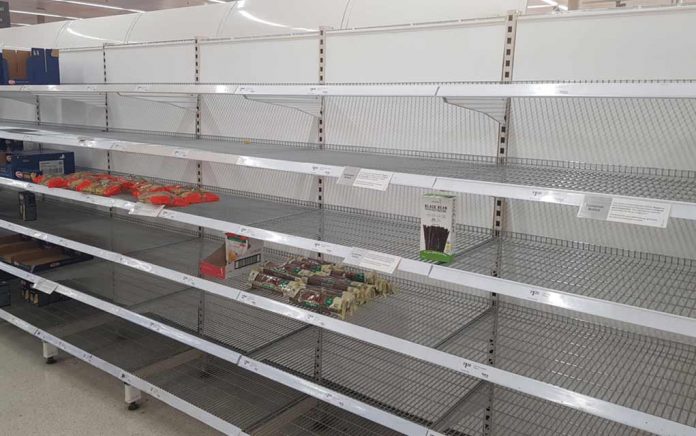
Prepping might be a lifestyle for some, but everyone can make use of common prepping techniques. You don’t need an underground bunker with years worth of supplies to survive the apocalypse (though that doesn’t hurt.)
The average person might wonder why they’d want to have a doomsday bunker or even prep at all. The answer is simple — there are a number of situations that you can more easily survive if you’ve done even a little bit of prepping.
Natural Disasters
Natural disasters can strike anyone, anywhere, and at any time whether it be tornadoes, hurricanes, wildfires, floods, or earthquakes. Wherever you live, you’re at risk of at least one of these events. There are three major things to consider when it comes to natural disasters:
- Do you have a bug-out plan?
- Do you know where the mains are in your home?
- Do you have an emergency supply?
Regardless of whether you’re staying in your house or evacuating, you’ll need to know where your utility shut-offs are and how to use them in order to prevent your home from being damaged or destroyed.
When disaster strikes you may only have the option to bug-out and evacuate your home. You need to not only have a plan of where you’re going. You need to have a bag of supplies to help you survive as well as a plan on evacuating. Have at least 3 days worth of emergency supplies, though we recommend 14 days.
Social Unrest
Social unrest is already here in America, although it could be much worse. School shootings, mass shootings, violent riots, and more can result from civil unrest. This is a prime reason why you should do at least some prepping.
What happens if you and your family are trapped in your area or stuck in a dangerous situation? This is when planning ahead can mean getting out safely, or at least knowing how to hunker down.
For example, if you’re in the middle of a protest area and people start to become violent, it could turn into a riot quickly. If you have an easy and quick way out, take it. If not, you’re gonna have to go with the flow until you can get away. If you’re trapped or cornered on all sides, then remember your list of safe areas that you created in advance and wait for the right time to escape.
Loss of Income
Unexpectedly losing your income is a prime reason why you should prep. This is a worst-case scenario for a lot of people, especially those with families. For this reason, you need to make sure:
- Have an emergency fund
- To stockpile of food and supplies
- To move toward self-reliance
Having an emergency fund is a good idea and will help you make it through these events easier. It’s completely at your discretion how large or small your emergency fund is. More is likely better than less, but something is better than nothing.
Slowly building toward a three to six month supply of food will prevent you or your family from going hungry. You’ll be surprised how quickly you can go through that amount of food, though. However, the important thing is that you’ll have a buffer while you find a new job.
Also, the more you move toward self-reliance, the less you’ll be affected by losing your income. Anyone can grow at least some of their own food, even if you’re in the city. Fishing and hunting are also valuable skills. If you have the option or the means, solar panels can help keep you from relying on grid power in case SHTF.
Pandemic
As the coronavirus has demonstrated, pandemics are more likely to happen than most people think. We’re in the middle of one right now. COVID-19 struck hard and fast, and it doesn’t seem to be letting up as new variants continue to spread.
When it first struck, the coronavirus caused mass panic, which led to people panic buying supplies. This in turn led to stress on the supply chain, making it harder to get the simplest supplies such as toilet paper. If everyone was just a little bit of a prepper, the shortages of supplies could have been avoided (or at least diminished).
Similarly to losing your income, the best thing to do in a situation like this is to have at least a year’s worth of supplies. Being self-reliant can also play a major part in your survival, so think about growing food, fishing or hunting. Access to clean water is a big concern in a pandemic situation, so make sure you’ve stockpiled on that and have multiple means of filtering or purifying water.
Nuclear Disaster
While a nuclear war wouldn’t wipe everyone out, surviving the fallout will be difficult. Depending on how far away you are from ground zero determines how badly you’ll be affected. It’s fair to assume there’s going to be more than one ground zero. Depending on the severity and scale of the attack, the subsequent nuclear winter could be more threatening than anything else.
The best thing you can do to prepare is stock up on supplies. Build up a shelter if you can, which can simply mean fortifying a room in your home. Basements are a great place, but if you don’t have one, use the most protected place in your home.
If you know the attack is coming, use anything you can to put material between you and the radiation: blankets, books, clothes, and any other object will help. This won’t be comfortable and you’re going to have to deal with these conditions for at least a few days after the nuclear blast.
Final Thoughts
These are just a few of the big reasons why everyone should prep. If anything, it’ll give you peace of mind knowing that you’re ready for the worst. You’ll fare a lot better if you’re prepared instead of winging it, especially if you’re inexperienced with survival skills in general.
Have you ever considered becoming a prepper? Has the coronavirus pandemic influenced your opinion on prepping in general? Reply to your email and share your thoughts, we would love to hear from you!
Copyright 2021, TheSurvivalGuide.com














